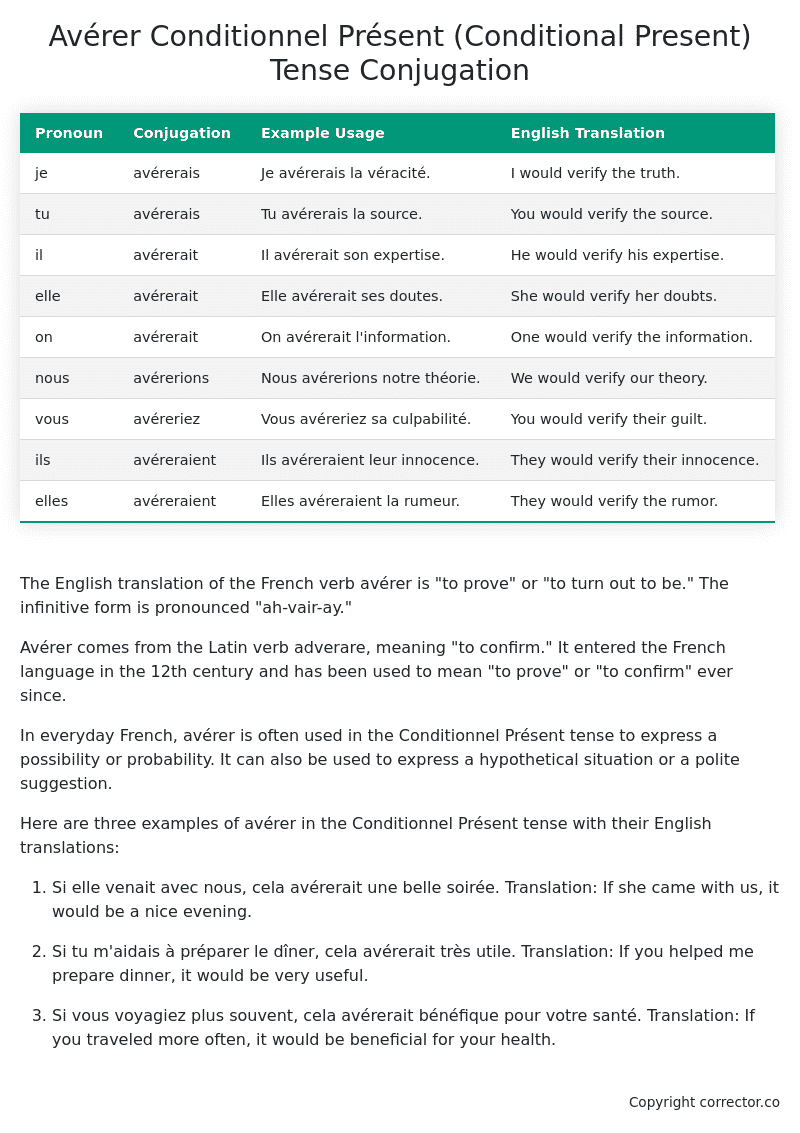Conditionnel Présent (Conditional Present) Tense Conjugation of the French Verb avérer
Introduction to the verb avérer
The English translation of the French verb avérer is “to prove” or “to turn out to be.” The infinitive form is pronounced “ah-vair-ay.”
Avérer comes from the Latin verb adverare, meaning “to confirm.” It entered the French language in the 12th century and has been used to mean “to prove” or “to confirm” ever since.
In everyday French, avérer is often used in the Conditionnel Présent tense to express a possibility or probability. It can also be used to express a hypothetical situation or a polite suggestion.
Here are three examples of avérer in the Conditionnel Présent tense with their English translations:
-
Si elle venait avec nous, cela avérerait une belle soirée.
Translation: If she came with us, it would be a nice evening. -
Si tu m’aidais à préparer le dîner, cela avérerait très utile.
Translation: If you helped me prepare dinner, it would be very useful. -
Si vous voyagiez plus souvent, cela avérerait bénéfique pour votre santé.
Translation: If you traveled more often, it would be beneficial for your health.
Table of the Conditionnel Présent (Conditional Present) Tense Conjugation of avérer
| Pronoun | Conjugation | Example Usage | English Translation |
|---|---|---|---|
| je | avérerais | Je avérerais la véracité. | I would verify the truth. |
| tu | avérerais | Tu avérerais la source. | You would verify the source. |
| il | avérerait | Il avérerait son expertise. | He would verify his expertise. |
| elle | avérerait | Elle avérerait ses doutes. | She would verify her doubts. |
| on | avérerait | On avérerait l’information. | One would verify the information. |
| nous | avérerions | Nous avérerions notre théorie. | We would verify our theory. |
| vous | avéreriez | Vous avéreriez sa culpabilité. | You would verify their guilt. |
| ils | avéreraient | Ils avéreraient leur innocence. | They would verify their innocence. |
| elles | avéreraient | Elles avéreraient la rumeur. | They would verify the rumor. |
Other Conjugations for Avérer.
Le Present (Present Tense) Conjugation of the French Verb avérer
Imparfait (Imperfect) Tense Conjugation of the French Verb avérer
Passé Simple (Simple Past) Tense Conjugation of the French Verb avérer
Passé Composé (Present Perfect) Tense Conjugation of the French Verb avérer
Futur Simple (Simple Future) Tense Conjugation of the French Verb avérer
Futur Proche (Near Future) Tense Conjugation of the French Verb avérer
Plus-que-parfait (Pluperfect) Tense Conjugation of the French Verb avérer
Passé Antérieur (Past Anterior) Tense Conjugation of the French Verb avérer
Futur Antérieur (Future Anterior) Tense Conjugation of the French Verb avérer
Subjonctif Présent (Subjunctive Present) Tense Conjugation of the French Verb avérer
Subjonctif Passé (Subjunctive Past) Tense Conjugation of the French Verb avérer
Subjonctif Imparfait (Subjunctive Imperfect) Tense Conjugation of the French Verb avérer
Subjonctif Plus-que-parfait (Subjunctive Pluperfect) Tense Conjugation of the French Verb avérer
Conditionnel Présent (Conditional Present) Tense Conjugation of the French Verb avérer (this article)
Conditionnel Passé (Conditional Past) Tense Conjugation of the French Verb avérer
L’impératif Présent (Imperative Present) Tense Conjugation of the French Verb avérer
L’infinitif Présent (Infinitive Present) Tense Conjugation of the French Verb avérer
Struggling with French verbs or the language in general? Why not use our free French Grammar Checker – no registration required!
Get a FREE Download Study Sheet of this Conjugation 🔥
Simply right click the image below, click “save image” and get your free reference for the avérer Conditionnel Présent tense conjugation!

Avérer – About the French Conditionnel Présent (Conditional Present) Tense
Formation
Common Everyday Usage Patterns
Expressing Polite Requests
Expressing Hypothetical Situations
Expressing Doubt or Uncertainty
Interactions with Other Tenses
Present Tense
Past Tense
Future Tense
Conditional Perfect
Summary
Want More?
I hope you enjoyed this article on the verb avérer. Still in a learning mood? Check out another TOTALLY random French verb conjugation!


